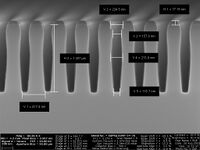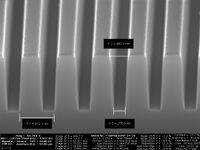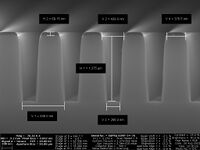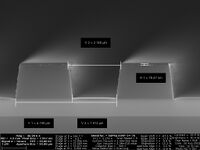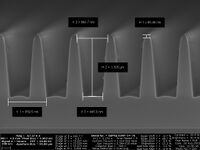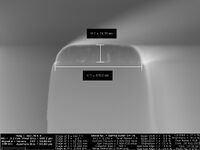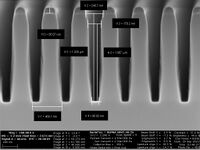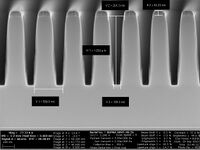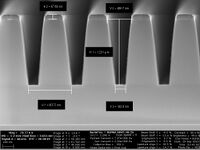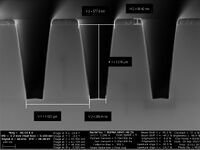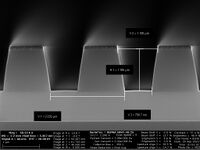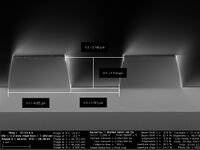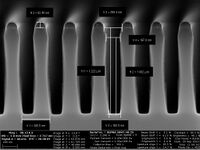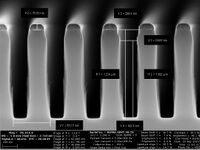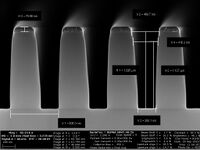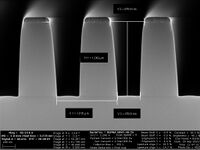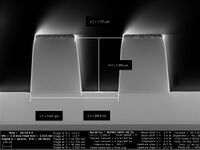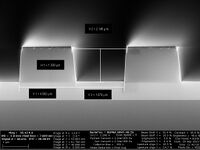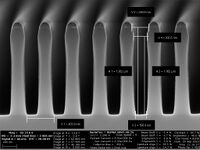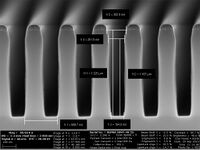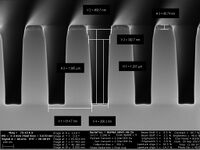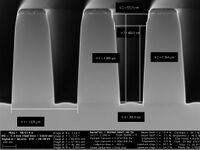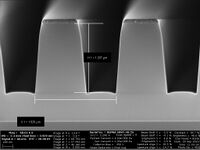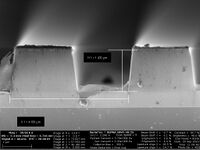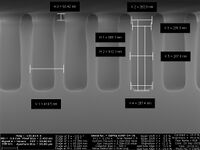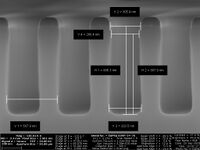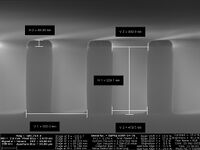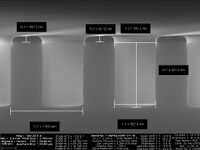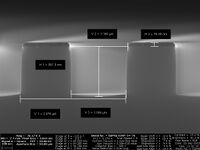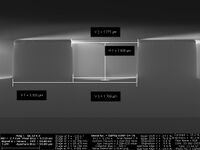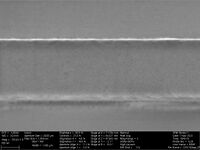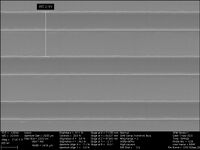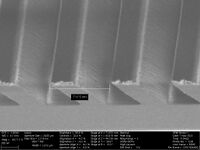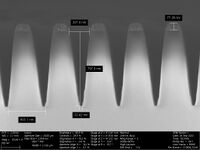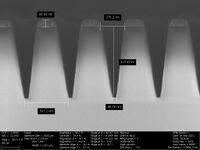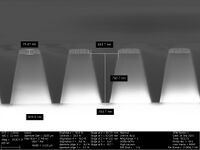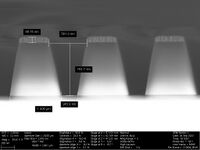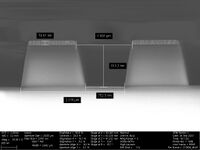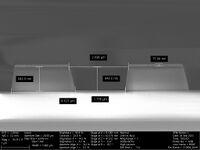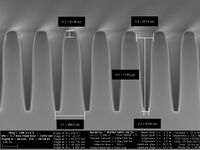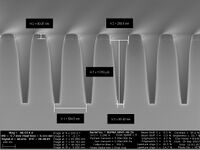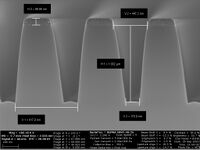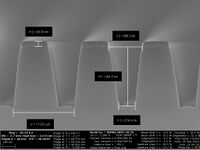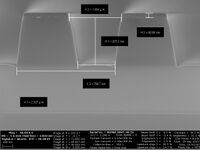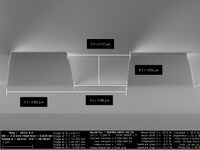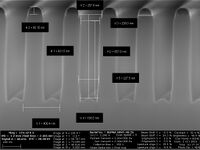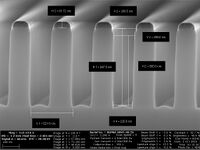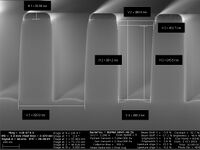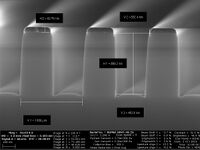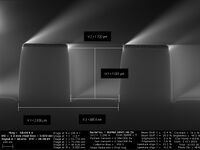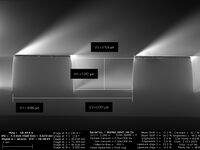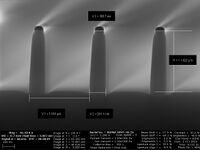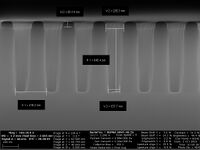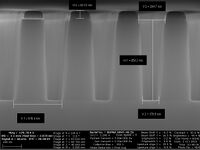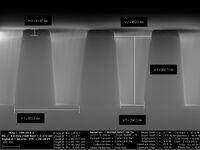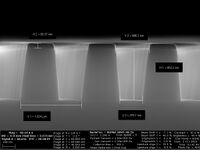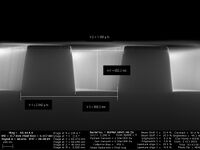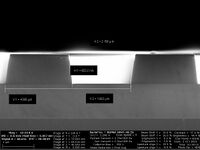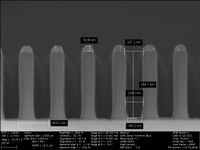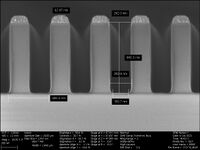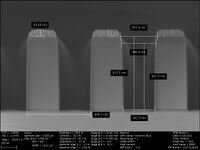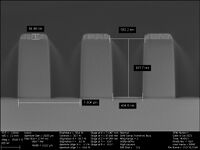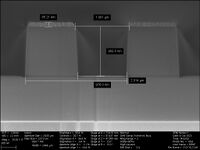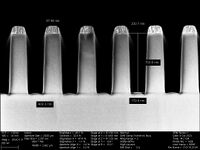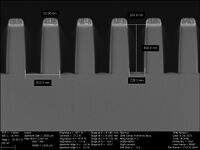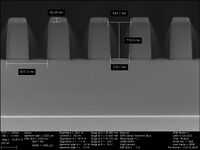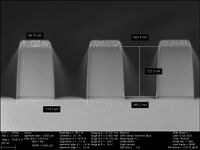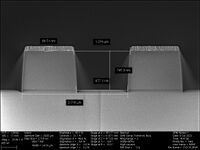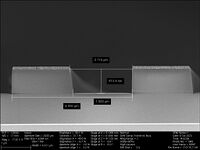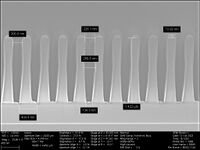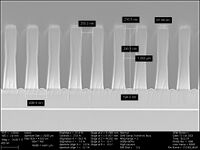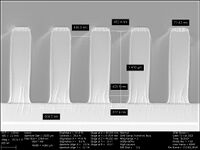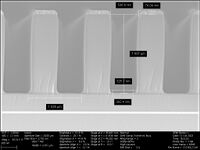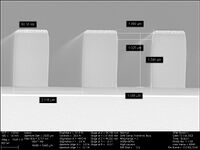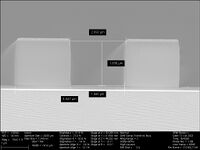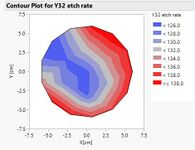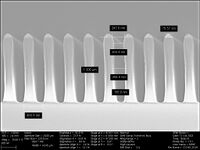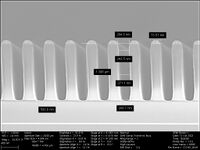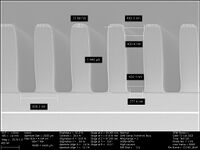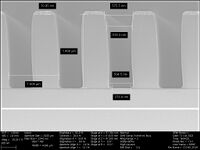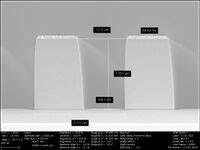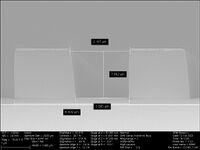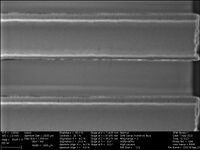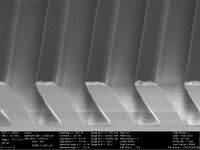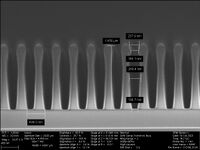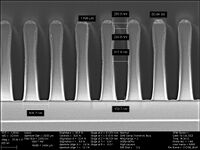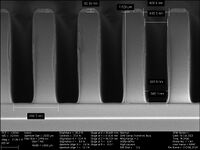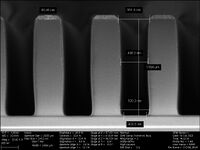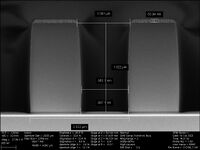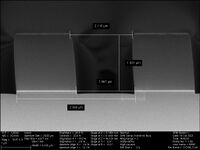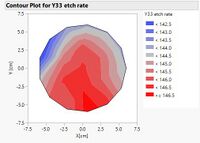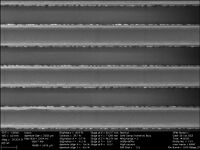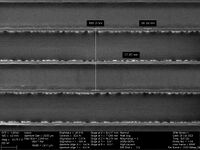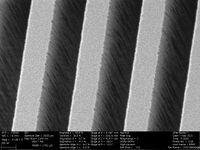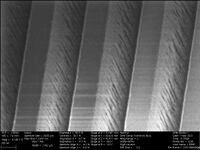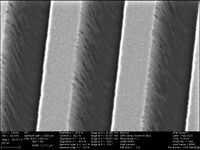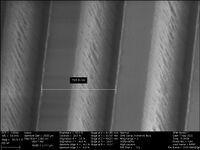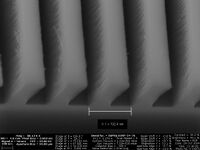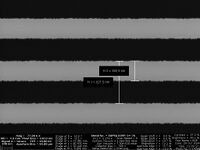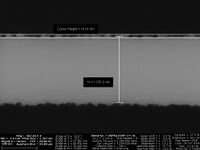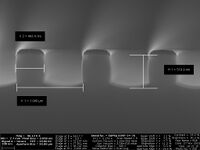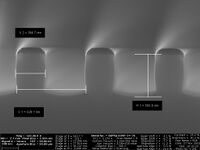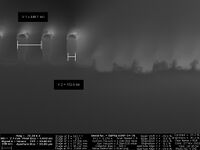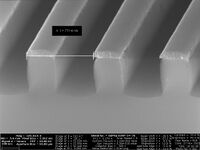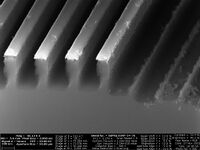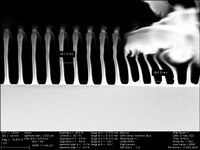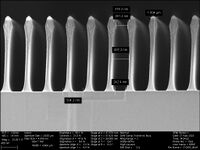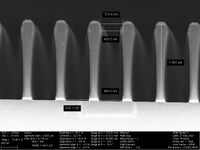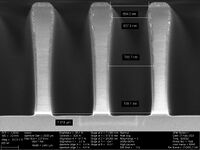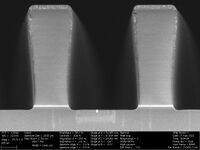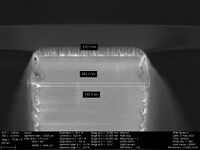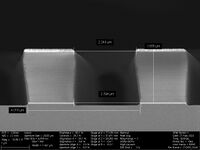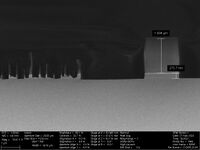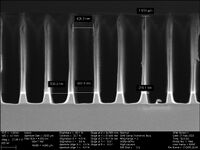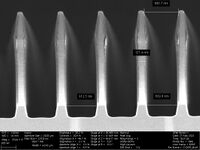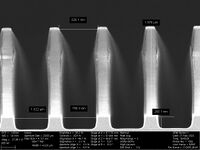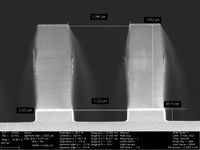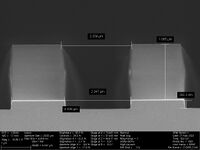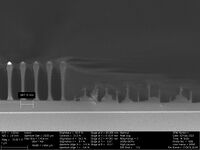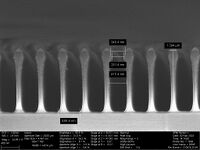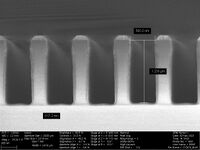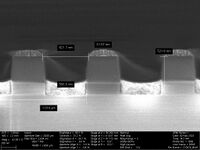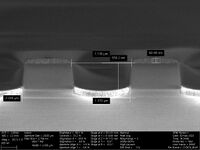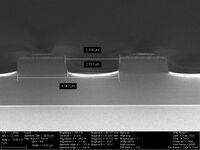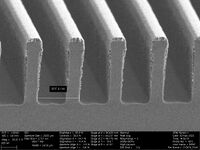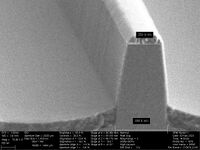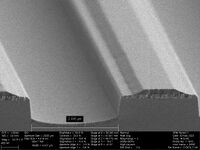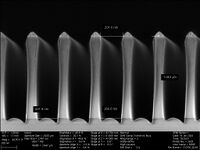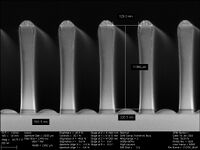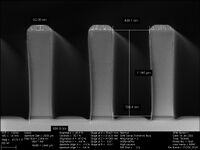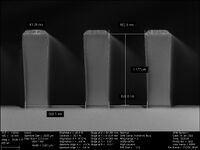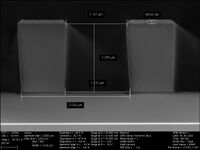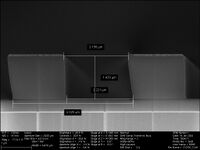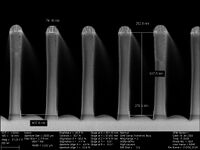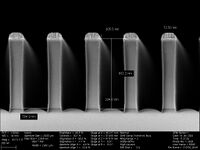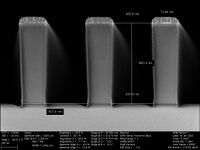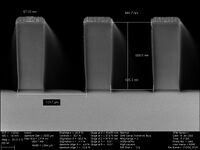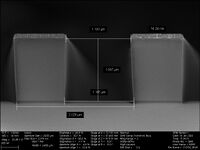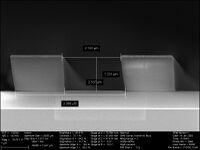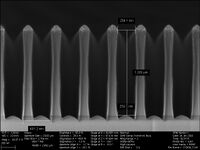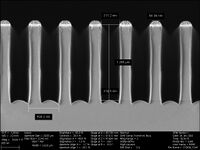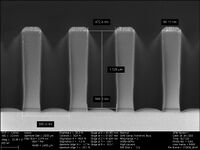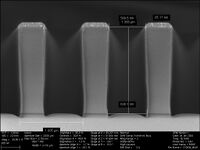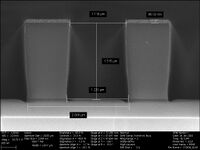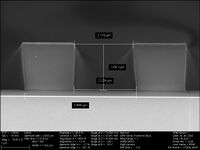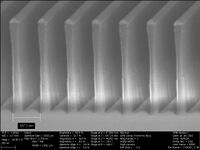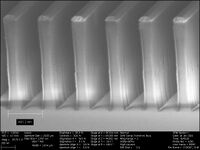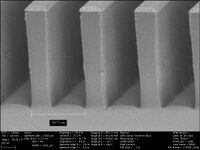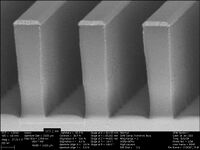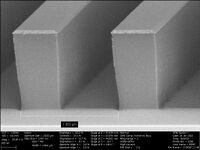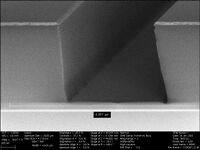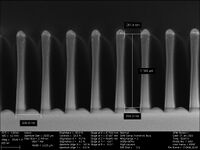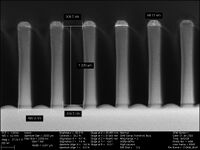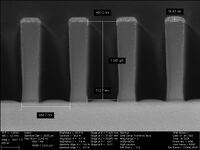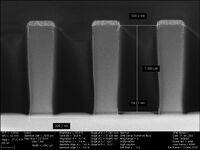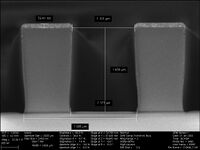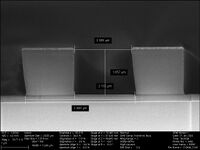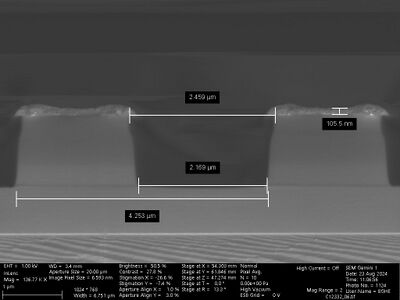Specific Process Knowledge/Etch/DRIE-Pegasus/Pegasus-4/SiO2 Etch/Cr mask: Difference between revisions
| (5 intermediate revisions by the same user not shown) | |||
| Line 374: | Line 374: | ||
|Running 1800W/150W at increased time to etch down to 1500 nm. | |Running 1800W/150W at increased time to etch down to 1500 nm. | ||
| | | | ||
<gallery caption="SiO2 etch with Cr mask on wafer piece on Si carrier '''10 min etch''', H2:0sccm, C4F8:13sccm He:205sccm O2:20sccm, Pressure:3.6mTorr; platen power 150W, coil power:1800W" perrow="6" widths="200px" heights="150px"> | <gallery caption="C10161 SiO2 etch with Cr mask on wafer piece on Si carrier '''10 min etch''', H2:0sccm, C4F8:13sccm He:205sccm O2:20sccm, Pressure:3.6mTorr; platen power 150W, coil power:1800W" perrow="6" widths="200px" heights="150px"> | ||
File:C10161_01.jpg | File:C10161_01.jpg | ||
File:C10161_03.jpg | File:C10161_03.jpg | ||
| Line 397: | Line 397: | ||
|Repeating the 1200W/100W recipes at 14 min but without the EM coils. For this recipe the uniformity over the wafer improved from removing the EM coils, so no need for those and now the recipe could run 14 min without damaging the hardware. The profile looked as before. After removing the Cr I looked from the top and with a tilted view and saw the the sidewall roughness was very bad. | |Repeating the 1200W/100W recipes at 14 min but without the EM coils. For this recipe the uniformity over the wafer improved from removing the EM coils, so no need for those and now the recipe could run 14 min without damaging the hardware. The profile looked as before. After removing the Cr I looked from the top and with a tilted view and saw the the sidewall roughness was very bad. | ||
| | | | ||
<gallery caption="SiO2 etch with Cr mask on wafer piece on Si carrier 14 min etch, EM:0/0 H2:0sccm, C4F8:13sccm He:205sccm O2:20sccm, Pressure:3.9mTorr; platen power 100W, coil power:1200W | <gallery perrow="7" widths="200px" heights="150px" caption="C10184: SiO2 etch with Cr mask on wafer piece on Si carrier 14 min etch, EM:0/0 H2:0sccm, C4F8:13sccm He:205sccm O2:20sccm, Pressure:3.9mTorr; platen power 100W, coil power:1200W"> | ||
File:C10184_01.jpg | File:C10184_01.jpg | ||
File:C10184_05.jpg | File:C10184_05.jpg | ||
| Line 411: | Line 411: | ||
File:C010184tilt20plasmaO2_07.jpg| tilt 20 degrees | File:C010184tilt20plasmaO2_07.jpg| tilt 20 degrees | ||
File:C010184tilt20plasmaO2_05.jpg| tilt 20 degrees | File:C010184tilt20plasmaO2_05.jpg| tilt 20 degrees | ||
File:C1018405.jpg|After RCA clean | |||
File:C1018402.jpg|After RCA clean | |||
File:C1018403.jpg|After RCA clean | |||
</gallery> | </gallery> | ||
|- style="vertical-align:top;" | |- style="vertical-align:top;" | ||
| Line 593: | Line 596: | ||
</gallery> | </gallery> | ||
|} | |} | ||
TEST: | |||
[[File:C12332_06.jpg|400px]] | |||
Latest revision as of 14:54, 29 October 2024
Feedback to this page: click here
Unless otherwise stated, all content in this section was done by Berit Herstrøm, DTU Nanolab
SiO2 trench etching with Cr mask
| Start parameters, variations noted in the gallery headline | Recipe name: no 10 with lower platen power |
|---|---|
| Coil Power [W] | 2500 |
| Platen Power [W] | 200 |
| Platen temperature [oC] | 20 |
| H2 flow [sccm] | 25.6 |
| C4F8 flow [sccm] | 25.6 |
| He flow [sccm] | 448.7 |
| Pressure | Fully open APC valve (8-9 mTorr) |
| Electromagnetic coils (EM) 'outer coil' / 'inner coil' | '2 A' / '30 A' (PLEASE DO NOT RUN WITH THESE SETTINGS FOR MORE THAN 6 MIN) |
- 100 nm Cr mask etched in ICP metal with 500nm DUV neg resist (NUV 2300-0.5) and 65 nm barc.
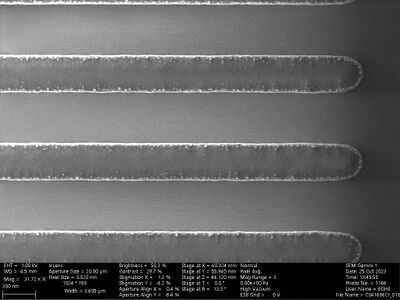
Results
| Temporary conclusions on how the process parameters affect the results in this study: | What process parameters affect the results? |
|
|
Profile SEM images
| Recipe settings | Comments | SEM gallery |
|---|---|---|
|
text |
|
|
More sidewall passivation on chip than on full wafer |
|
|
Less sidewall passivation from removing the H2 |
|
|
Not a large effect from adding a little O2 |
|
|
Reducing total flow rate and thereby the pressure gives less passivation/redeposition. Sidewall roughness not so bad. |
|
|
Reducing the coil power a lot and platen power a little gives more sidewall passivation/redeposition |
|
|
Adding oxygen reduces the passivation/redeposition |
|
|
Adding more oxygen reduces further the passivation/redeposition but some trenching appears. |
|
|
Increasing coil power reduces trenching but increases passivation/redeposition |
|
|
Adding more O2 reduces the sidewall passivation/redeposition |
|
|
Running with the lower coil power and reducing the platen power also seems to reduced the sidewall passivatin/redeposition, but etch rate goes down |
|
|
Repeating with longer etch time to etch 1500 nm down. Unfortunately this damaged the hardware due to the EM coils getting too hot. |
|
|
Running 1800W/150W at increased time to etch down to 1500 nm. |
|
|
Repeating the 1200W/100W recipes at 14 min but without the EM coils. For this recipe the uniformity over the wafer improved from removing the EM coils, so no need for those and now the recipe could run 14 min without damaging the hardware. The profile looked as before. After removing the Cr I looked from the top and with a tilted view and saw the the sidewall roughness was very bad. |
|
|
Tried high coil power and low platen power. This seemed to give som undercutting,especially on the narrow lines. The smallest has been etched away. The etch rate was very low |
|
|
Increasing the platen power and and removing the oxygen helped on the under cutting but the lines are still very narrow at the bottom. It also increased the etch rate |
|
|
Adding the oxygen again further increased the etch rate and reduced the CD (Critical Dimension) of the Cr mask. |
|
|
I repeated the start setting but without the EM coils. This gives a very none uniform etch over the wafer where in some parts it deposites instead of etching. The profile of 800 nm oitch look fairly good but a closer look reveals the the sidewall is very rough from either redeposition or polymerization. this cannot be removed with a O2 plasma. |
|
|
Due to the large sidewall roughness I decided to try and run at lower powers because it looked at some images like an ionbonbardment effect. First try with 600W/50W. The profile looks fairly good but still with some sidewall roughness. there is also some trenching and the Cr mask looks has a facet all the way down to the SiO2. The is also some bowing. |
|
|
Even lower powers: 300W/25W. The profiles looks better with less roughness but also mush slower etch rate, so not as deep as the previous. |
|
|
Repeating with longer etch time. Low sidewall roughness, less faceting of the Cr mask. Still some trenching and bowing or negative tapering of the profile. |
|
|
Decreased the platen power a little to see if this could remove the trenching. Not much different from the last. |
|

